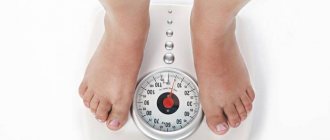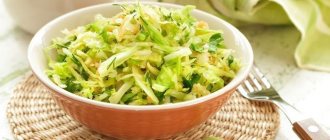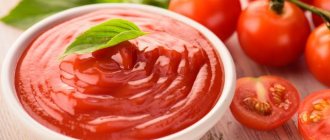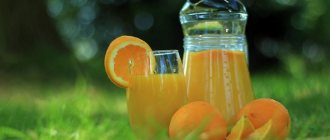Why do older people need to watch their weight?
According to statistics, people over 60 years of age experience worsening health. Irreversible changes occur in all organs and systems of an elderly person. Most diseases become chronic. Excess weight further aggravates the situation if it does not become the root cause of the disease. The risk of cardiovascular diseases (atrial fibrillation, coronary heart disease, left ventricular chamber enlargement, hypertension, left atrium enlargement, etc.) increases with increasing load on the body.
In an obese elderly person, the frequency of falls increases, the degree of stability decreases, the quality of gait deteriorates, and the level of general motor activity generally decreases. Heavy weight leads to diseases of the spine and joints: osteochondrosis, arthritis, arthrosis, which increases the risk of disability. Excess weight from poor nutrition negatively affects the quality of life of a person over 60 years of age.
Pensioners in old age experience a slowdown in metabolism. Certain types of metabolism change unevenly. Age-related changes in protein metabolism appear first. A decrease in the activity of carbohydrate metabolism is associated with a decrease in the activity or amount of the hormone insulin. Tissues lose sensitivity to its effects, which, in extreme cases, can lead to type 2 diabetes. A disorder of fat metabolism causes vascular atherosclerosis. Age-related changes in metabolism cause excess weight gain and obesity.
The knees suffer from the heavy load on the legs and are overweight, and there is a high risk of varicose veins.
Accumulations of fat around internal organs interfere with their normal functioning. Excess weight often causes problems with the liver, heart, kidneys, pancreas and stomach. Abdominal (abdominal fat) compresses the diaphragm, as a result, breathing becomes difficult, lung volume decreases, which leads to frequent diseases of the respiratory system: bronchitis, pneumonia, etc.
Excess weight in old age is the enemy of all organs and systems of the body. Combined with a slow metabolism and existing diseases, it negatively affects health. Therefore, despite the seeming difficulty of getting rid of extra pounds, keeping the body in good shape is the right motivation on the way to the goal.
Recommended articles on this topic:
- Features of older people: psychological and physiological
- The main problems of older people and ways to solve them
- Boarding home for the elderly: features and rules of choice
Principles of nutrition for elderly and senile people
With age, energy consumption and basal metabolism decrease, physical activity decreases, and muscle mass decreases. This leads to a natural decrease in the need for nutrients and energy.
Recommended caloric intake is:
* for women over 60 years old – 1900-2000 kcal
* for men over 60 years old – 2000-3000 kcal.
It is necessary to follow a diet. The intervals between meals should not exceed 4 hours.
Calorie distribution:
* 1st breakfast – 25%
* 2nd breakfast – 15%
* lunch - 35%
* dinner - 25%
Protein deficiency is the cause of various disorders - decreased muscle strength, physical fatigue at the slightest effort, etc. The optimal daily protein intake is 1.0 – 1.2 g per kilogram of normal body weight. The proportion between animal and plant proteins in the diet is 1:1. Among animal proteins, preference should be given to protein from fish and dairy products and limit the consumption of meat and meat products. It is advisable to arrange fast days 1-2 times a week. The most useful are river fish (pike perch, pike, carp), and among sea fish - cod varieties.
Elderly people are recommended to include up to 30% protein in their diet from dairy products (100 g of cottage cheese per day), low-fat or low-fat, 10-20 g of cheese of any kind, preferably mild and unsalted varieties.
The optimal amount of fat is 0.8-1 g per kilogram of normal body weight, energy value no more than 30% of the daily calorie content (76-85 g per day). It is important to consume fats of vegetable origin (sunflower, corn, olive, flaxseed, pumpkin oil), which have a stimulating effect on oxidative processes in the body. And among animal fats, butter should occupy the main place as it is the most easily digestible and rich in vitamin A. It is recommended 5 g per day with prepared food, before serving directly.
The carbohydrate diet should be reduced to 200-300 g per day. These carbohydrates should be distributed between bread (50-55%), potatoes (20%), most vegetables (5-10%) and milk (50%). The amount of ordinary bread, which is a highly fermented product, should be reduced to 100-200 g. Wholemeal bread is recommended. Fresh vegetables can be consumed in large quantities. Leeks, artichokes, asparagus, green beans, carrots, turnips, beets, and cabbage contain fiber, a waste product that is extremely valuable for intestinal motor function. Fruits should be consumed mainly fresh. If eating fruits in old age is associated with stool retention and increased gas formation, it is better to consume them boiled or baked.
Vitamins, due to their catalytic properties, are able to inhibit the development of aging processes. Particular attention should be paid to the intake of antioxidant vitamins (C, E, A, beta-carotene), bioflavonoids, which provide protection to cellular biomembranes. Vitamins B12.6 and folates help reduce the risk of developing an atherosclerotic process. It is necessary to increase the intake of vitamins E, C, etc. In and RR and others. In old age, vitamin deficiency often occurs due to changes in the activity of enzyme systems. In addition to vitamins E and D, it is necessary to use vitamin C and folic acid.
Folic acid deficiency contributes to atherosclerosis, mental disorders, apathy, poor wound healing, and susceptibility to infectious diseases. Vitamins should be supplied to the body moderately and comprehensively. Being antioxidants and immunomodulators, vitamin-mineral complexes perform the function of geroprotectors.
Equally important is adequate dietary intake of minerals. Older people often experience mild forms of iron deficiency anemia and changes in bone tissue caused by impaired metabolism of calcium and iron in the body. The aging body is able to accumulate calcium in the walls of blood vessels, while calcium deficiency leads to osteoporosis and bone fractures. The effect of calcium on iron absorption can be reduced by reducing calcium intake at breakfast and lunch, when the bulk of dietary iron is supplied. Limiting calcium intake in general is undesirable, since in many cases there is an increased need for both elements. The solution to the problem is vitamin-mineral complexes, which provide separate administration of calcium and iron.
Acute intestinal and other chronic infections play a role in the formation of the intestinal microflora of older people; long-term use of medications that affect microflora; chronic diseases of the gastrointestinal tract, accompanied by a decrease in the secretory function of the stomach and pancreas. Fermented milk products and dietary fiber, bifidofactors normalize the intestinal microflora.
It is necessary to provide the body of an elderly person with a sufficient amount of dietary fiber (cellulose, hemicellulose, pectin, lignin, etc.). Their function is to create optimal conditions for intestinal endoecology, normalize the activity of the gastrointestinal tract, activate motility, digestion and absorption in the intestines, etc.
Center for Public Health and Medical Prevention of the Kaliningrad Region
Dangerous methods of losing weight in old age
To lose weight, people often use diuretics such as Lasix. Weight is reduced due to the rapid elimination of fluid, which is achieved by taking diuretics.
Lasix is the brand name under which one of the most popular diuretic drugs, Furosemide, is distributed. This name is used to refer to all Furosemide analogues. Lasix works by increasing the production of urine by the kidneys. The use of a diuretic is aimed at quickly removing excess fluid from the body. It is prescribed for edema of cardiac, renal and hepatic origin. Within an hour after taking the tablet, the volume of urine in the kidneys increases several times.
Furosemide is usually prescribed for emergency care, but for liver cirrhosis, edematous heart failure syndrome, and nephrosis, the diuretic is prescribed for long-term use. In addition to the large volume of fluid, Lasix removes useful potassium from the body. The water-electrolyte balance is disturbed, so Panangin and Asparkam are prescribed along with Furosemide. Long-term use of Lasix causes many side effects. Using the drug to lose weight is very dangerous!
There is a risk of hypokalemia. Potassium ions together with sodium create conditions for muscle contractions, normalize water-salt balance, and regulate acid-base balance. Potassium deficiency causes weakness and muscle pain, and in severe cases, paresis, flaccid paralysis, and intestinal obstruction. If the amount of potassium in the blood is halved, death may occur due to respiratory and cardiac arrest. And even in the case of successful resuscitation, complete restoration of the functioning of the body is impossible. Therefore, if an elderly person wants to lose weight by taking Lasix, he dooms himself to serious disruptions in the functioning of vital organs.
Similarly, prolonged use of diuretics leads to a critical drop in blood pressure. Increased removal of fluid from the body contributes to blood thickening and deterioration of the supply of oxygen and nutrients to tissues and organs. Nausea and vomiting, loss of appetite, digestive disorders, skin rash, collapse, and fainting may occur, which may result in intensive care for an elderly person. Furosemide is taken strictly as prescribed by a doctor and is available only with a prescription.
We recommend
“Adaptation of older people: in modern society and boarding homes” Read more
Can you lose weight from Lasix?
People have been trying to lose weight for quite some time with the help of diuretics, in particular Lasix. Taking diuretics is aimed at quickly getting rid of fluid, which gives some weight loss.
The drug, marketed under the brand name Lasix, is a powerful diuretic with the international name furosemide. It affects the tubules in the kidneys in such a way that within half an hour to an hour the volume of urine produced by the kidneys increases many times. This is necessary when there is an urgent need to remove excess fluid from the body (in particular, from the blood) - in case of cerebral or pulmonary edema, hypertensive crises, etc. Therefore, furosemide is an emergency drug. Long-term use of furosemide is prescribed for liver cirrhosis, nephrosis, and edematous heart failure syndrome.
Taking Lasix for a long time can lead to fluid and electrolyte imbalance. Most often it manifests itself in the form of hypokalemia - increased excretion of potassium in the urine. This is a very dangerous symptom, so asparkam and panangin are usually prescribed simultaneously with furosemide.
Thus, the conclusion is clear: taking Lasix for weight loss is dangerous!
Firstly, because of the danger of hypokalemia. Without potassium, normal functioning of the muscles responsible for heart contractions is impossible. Even with a slight potassium deficiency, weakness and muscle pain are felt, and in more serious cases, paresis and flaccid paralysis, and intestinal obstruction may occur. If half the normal amount of potassium is removed from the blood, a person may die due to respiratory and cardiac arrest. Moreover, even if the patient can be resuscitated, the chances of complete restoration of all body functions are very small. Therefore, losing weight with Lasix is a very dangerous decision for an elderly person.
Secondly, due to a critical drop in blood pressure. With increased removal of water from the body, the blood thickens and supplies oxygen and nutrients to organs and tissues worse. This can lead to nausea and vomiting, loss of appetite, digestive disorders, skin rashes, collapse and even fainting, which can result in resuscitation, especially in an elderly person. Therefore, furosemide (under any trade names) is sold in pharmacies only with a prescription from a doctor, and it must be taken in full accordance with medical prescriptions.
Read material on the topic: How the body of an elderly person changes and what to do about it
How to lose weight for an elderly person
Doctors recommend that an overweight pensioner lose weight. Excess weight provokes exacerbation of chronic diseases and disruption of organs and systems. Often, new diseases arise for this reason. But how can an elderly person lose weight? Only a specialist with a medical education can answer this question. Uncontrolled weight loss will only harm the pensioner. The issue of losing weight must be approached responsibly and carefully. Inpatient obesity treatment is a safe option, but not every elderly person can afford it.
If you follow some recommendations, you can try to lose weight at home. In this case, it is important to follow the principle of gradualism, without radically changing nutrition and exercise. For elderly people, measures for losing weight such as fasting, two or more fasting days a week, and express diets are strictly contraindicated. Even losing two kilograms in a month is a big stress for an elderly body, the consequences of which can be nervous breakdowns, metabolic disorders and other important vital processes. Therefore, you should not strive to become slim in a short time.
How can an elderly person lose weight safely? To do this, you must follow the following rules:
- Method of eating. Chewing thoroughly will better prepare the food for digestion in the stomach. Large pieces have a negative effect on the gastrointestinal tract, as they are processed longer and require more time to become saturated with enzymes. As a result, gastritis and stomach ulcers may occur.
- Method of cooking. Over the course of their lives, people become accustomed to certain foods. By keeping dumplings, fried potatoes, rich broths, bread, pasta in the diet, grandparents expose the body to unnecessary stress. With age, the amount of energy expended decreases; such heavy and filling meals not only do not bring benefits, but also add harmful substances and extra calories. Those who decide to lose weight in old age need to be patient and muster all their willpower. It is worth including light, low-fat, low-calorie foods in your diet. Over time, an older person will develop new eating habits, and the body will adapt to foods with fewer calories.
- Optimal food. Vegetables should be included in the daily menu of older people who want to lose weight. Due to poor absorption of fiber in older age, vegetables need to be boiled, stewed, baked, steamed or eaten pureed.
How to lose weight for an elderly person? Here are the tips from nutritionists:
1. Compliance with the diet.
It is important for pensioners, just like children, to follow a diet. To control your metabolism, you need to eat at the same time. The stomach and digestive system will get used to active work at certain hours, which will allow them to regulate their activity.
You also need to get used to eating fractional meals. During the day there should be three main meals and two to three snacks. With age, metabolism slows down, so if you eat infrequently, but in large portions, then there is a risk of gaining weight. To lose weight, an elderly person needs to eat more often, but in small portions.
2. Reducing caloric intake by 20–25%.
If an elderly person is used to eating too richly, then the energy value of food should be reduced gradually in order to prevent severe stress on the body.
When the total daily consumption is 2000 kcal, you need to further reduce this value to 1600–1800 kcal per day.
It is unacceptable in old age to go on mono- and strict diets, so as not to deprive the body of necessary minerals and vitamins, which are already lacking.
3. Balancing the diet with vitamins and minerals.
Elderly people need to think through their diet in such a way that it contains all the minerals, vitamins and trace elements. The diet should be balanced and selected taking into account age characteristics.
Thus, the body of an elderly person needs calcium and phosphorus to support bones that become fragile. He also needs potassium, magnesium and B vitamins. These microelements support the cardiovascular and nervous system, they are needed for the prevention of hypertension, arrhythmia, stroke, heart attack, neuralgia and other diseases.
4. Exclusion of indigestible and refractory fats from the menu.
The consumption of animal fats in old age should be minimized, replacing them with vegetable fats and polyunsaturated acids. Animal fats increase cholesterol levels in the blood, which negatively affects the functioning of the heart and blood vessels.
You cannot completely abandon these components of food. The diet must be balanced, including the ratio of proteins, carbohydrates and fats. In old age, skin elasticity is lost and disruptions occur in the hormonal system. A low-fat diet will inevitably lead to even more problems.
Ideal foods for older people trying to lose weight are lean meats (chicken and turkey fillet, rabbit, veal, quail), fish, low-fat dairy and fermented milk products, rennet cheeses. It is necessary to exclude mayonnaise and fatty sour cream from the diet; eat egg yolks in small quantities.
Eating seafood, nuts, and cold-pressed vegetable oil will fill the need for the right fats. In addition, they are high in Omega-3 fatty acids, which lower blood cholesterol levels, so an older person can lose weight naturally.
5. Eating light proteins.
Digestion of protein foods in the stomach is difficult. But proteins increase muscle mass by reducing fat mass. Despite the fact that an elderly person should not strive for a sculpted body, it is still necessary to keep the muscles in shape.
Adequate muscle mass helps speed up metabolism, which is necessary for controlling body weight in old age. Moderate physical activity also helps prevent neuralgia, pinched nerves and muscle tension.
After 60 years, it is enough to consume 0.8–1 g of protein per kilogram of weight. The optimal source of protein for older people with reduced physical activity is considered to be lean fish, lean meat, eggs, nuts, cereals, and legumes.
It is necessary to give preference to dairy products with zero or minimal fat content and consume them in limited quantities. This is due to the fact that older people are often allergic to milk and have difficulty digesting lactose. Calcium is washed out of the body when taken in excess. And there is also a risk of developing cancer when consuming dairy products.
Betty Kaan led a team of researchers to study the statistics of women diagnosed with early-stage invasive breast cancer between 1997 and 2000. The study found that women who regularly consumed dairy products had a higher mortality rate from cancer. Those who drank more than one cup of high-fat milk every day had a 50% increase in the likelihood of dying from cancer over the next 12 years.
6. Limiting the consumption of simple carbohydrates.
Simple carbohydrates in old age can lead to diabetes. It is imperative to limit the consumption of sugar, pastries, bread, potatoes, and sweets. On the contrary, it will be useful to include complex carbohydrates in your diet: whole grain bread, cereals, vegetables, berries, fruits, durum wheat pasta.
We recommend
“A set of exercises for older people: body and breathing” Read more
Plant fiber and dietary fiber normalize digestion and relieve constipation. Fruits and vegetables allow you to eat a low-calorie, but satisfying diet and help you lose weight.
7. Compliance with the drinking regime.
Insufficient fluid intake, which is typical for most older people, causes a number of problems: excess weight, difficulty in the natural elimination of waste and toxins, and deterioration of the skin. The formation of a large number of wrinkles on the face and sagging skin on the body are the consequences of insufficient water consumption. To minimize these problems, elderly people, in the absence of contraindications, need to drink about 1.5 liters of water daily.
Along with adequate fluid intake, limiting salt is an important factor in helping older adults lose weight. Its excess retains moisture in the body, causing swelling, which can lead to increased blood pressure. In case of hypertension, swelling and fluid retention are unacceptable. Therefore, hypertensive patients take medications with a diuretic effect.
8. Limiting the consumption of foods that stimulate the appetite.
It is necessary to exclude or severely limit strong meat and fish broths, sauces, smoked meats, pickles, spices, and alcohol in the diet.
By stimulating the appetite, these foods promote overeating. They are also difficult for the stomach of older people, which can negatively affect the functioning of the gastrointestinal tract.
9. Reduce salt and sugar consumption.
Salt and sugar should be kept to a minimum. A large amount of salt leads to swelling, causes high blood pressure and joint diseases.
Sugar disrupts carbohydrate metabolism, which leads to the development of diabetes. In addition, sugar has a very high calorie content. Its excessive consumption contributes to rapid weight gain.
For older people trying to lose weight, it is better to completely eliminate sugar, replacing it with sweeteners.
In the absence of renal failure and excess potassium in the body, ordinary table salt can be replaced with dietary salt. It contains microelements useful for the cardiovascular system: magnesium and potassium.
If it is not possible to consume dietary salt, you must follow the following rules:
- Eat no more than 5-7 g of salt per day.
- Replace regular salt with sea salt or iodized salt.
- Salt food after cooking, not during the process.
10. Carrying out fasting days.
You cannot make your own decision about fasting days. To do this, you need to consult a nutritionist or your doctor. Fasting days should be organized carefully and infrequently.
It is necessary to eat well, providing the body with all nutrients, vitamins and minerals.
11. Physical education classes.
Let's consider how to provide physical activity to an elderly person in order to lose weight without compromising their health. Sports should be present in everyone's life. Older people need to increase their physical activity. You may need to reconsider your daily routine to include daily morning exercises (preferably in the fresh air), walking, cardio exercises (treadmill, stepper, exercise bike, etc.). Training should be regular, the degree of load is determined by the doctor after conducting the necessary examinations.
Features of nutrition in old age
- home
- For patients
- Healthy lifestyle
- Features of nutrition in old age
- Urgent Care
- News
- In-depth medical examination
- Doctors schedule
- Attached population
- Search by area
- Reception schedule for citizens
- Question answer
- Reviews
- Healthy lifestyle
- Phonebook
- Documents and licenses
- Site Map
- general information
- Medicine provision
APPOINTMENT IS AVAILABLE:
At the registry if you have a medical policy
By the registry phone
: +7 (Vorovskogo St., 16)
Online
via the Internet at https://talon.zdrav74.ru
We recommend making an appointment with specialists via the Internet if you have a referral in hand or you are registered with a specialist. In other cases, please contact your physician first. Information about paid services
:
+7 Information desk:
+7
Calling a doctor to your home
: +7
15.10.2018
According to centuries-old observations, the life expectancy of earthlings is constantly increasing. If at the beginning of the last century the average life expectancy was 35-40 years and 50-year-olds were considered very old, then by the end of the 20th century the average life expectancy increased to 70-75 years.
According to the World Health Organization age classification, biological age has now changed significantly. From 25 to 44 years old is a young age; 44-60 years is the average age; 60-75 years old - old age; 75-90 years - old age; 90 years and older are long-livers. Moreover, in many developed countries there is an increase in elderly people, senile people and long-livers.
Scientists have not reached a consensus on the reasons for such a sharp increase in life expectancy. Some associate this with the development of civilization: people moved from cave life to warm dwellings, provided themselves with sufficient food, medical care, etc. Others explain this by the evolutionary development of the human race...
Be that as it may, nutrition has an important influence on the life of a person of any age, and especially the elderly .
Changes occurring in the body of older people
The process of human aging is manifested by the natural development of changes in the structure and function of various organs, including the organs of the digestive system. The most pronounced changes are observed in the oral cavity:
1. The preserved teeth have a yellowish tint and varying degrees of wear.
2. The volume of the oral cavity and salivary glands decreases
3. With age , saliva production decreases, so elderly and old people often experience dry mouth, cracked lips and tongue.
4. As a person ages, the esophagus lengthens somewhat and becomes curved due to increased kyphosis of the thoracic spine and expansion of the aortic arch.
5. With age, the frequency of reflux (return of stomach contents into the esophagus) increases, which is associated with a decrease in the tone of the esophageal sphincter muscles.
6. The total length of the intestine increases ; lengthening of individual sections of the colon is more often observed.
7. changes : the number of putrefactive bacteria increases, the number of lactic acid bacteria decreases, which contributes to an increase in the production of endotoxins and, ultimately, disruption of the functional state of the intestine and the development of a pathological process.
8. There is a decrease in liver mass.
9. The gallbladder increases in volume due to lengthening and increasing the tone of the muscles of the bladder wall, which also contributes to stagnation of bile. This factor, combined with increased cholesterol secretion, creates the prerequisites for the development of gallstone disease in elderly and senile people.
10. Atrophic changes in the pancreas develop after 40 years.
Poor nutrition in old age often leads to such serious diseases as chronic gastritis, peptic ulcers, chronic hepatitis, chronic pancreatitis, chronic colitis, diabetes mellitus, etc.
To avoid such diseases, it is necessary to: strictly follow the principles of nutrition, satisfy the body’s need for nutrients, and adhere to a diet.
Compliance with nutritional principles
When organizing nutrition for older people, it is necessary to take into account, first of all, the reduced capabilities of the digestive system. In this regard, the main nutritional requirements for older people are:
1. Moderation, i.e. some restriction of nutrition in quantitative terms.
2. Ensuring high biological nutritional value due to the inclusion of sufficient quantities of vitamins, biomicroelements, phospholipids, polyunsaturated fatty acids, essential amino acids, etc.
3. Enrichment of nutrition with natural anti-sclerotic substances, contained in significant quantities in some foods.
Nutrient requirements
Full satisfaction of the aging body's nutritional needs is a guarantee of protection against disease. How does this need manifest itself?
1. Protein requirements. A decrease in overall performance in old age and often the cessation of intense physical work is the basis for reducing the protein norm. However, in older people there remains a need for regeneration and restoration of worn out, aging cells, which requires protein (the more, the higher the tissue wear and tear).
2. Need for fats. Fats in the diet of older people should be limited. A connection has been established between abundant fat consumption and the development of the atherosclerotic process. Along with butter, you must also use vegetable oil. It in the amount of 20-25 g per day provides a sufficient supply of those substances that are necessary in old age (polyunsaturated fatty acids, etc.).
3. Need for carbohydrates. In the generally accepted formula for a balanced diet, the amount of carbohydrates is on average 4 times higher than the amount of protein. This ratio of protein and carbohydrates is acceptable for older people only with an active, active lifestyle. With little physical activity, the amount of carbohydrates should be reduced. Whole grain products (rye and wheat bread made from wallpaper flour, etc.), as well as potatoes and other vegetables, are desirable as sources of carbohydrates. You should also use products that contain a lot of fiber and pectin. Fiber helps remove cholesterol from the body.
Of particular value are raw vegetables and fruits, which have the most active biological effect.
1. Need for vitamins. Vitamins, due to their properties, are able to slow down the aging process to a certain extent. Of particular importance are vitamins that have a normalizing effect on the state of the vascular and nervous systems, as well as vitamins involved in reactions associated with inhibition of the development of the sclerotic process, these are vitamins: C, P, B12, B6.
2. Requirement for minerals. The balance of minerals in the diet of older people is less necessary than in adulthood and middle age.
is of particular importance in the mineral metabolism of older people . Its excess leads to the deposition of salts in the walls of blood vessels, in joints, cartilage and other tissues.
Currently, the generally accepted calcium norm for older people is the norm adopted for adults, i.e. 800 mg. per day.
1. An important mineral element in old age is magnesium. It has an antispasmodic and vasodilating effect, stimulates intestinal motility and increases bile secretion. The effect of magnesium on lowering cholesterol in the blood has been established. With a lack of magnesium, the calcium content in the walls of blood vessels increases. The main sources of magnesium in human nutrition are cereals and legumes. The daily requirement for magnesium is 400 mg.
2. Potassium also plays an important role in old age and old age . It increases the excretion of water and sodium chloride from the body. In addition, potassium increases heart contractions. All foods in the diet are involved in the daily supply of potassium. However, in old age, the most beneficial sources of potassium are raisins, apricots, and potatoes.
3. For older people, it is desirable to strengthen the alkaline orientation of nutrition due to increased consumption of milk and dairy products, potatoes, vegetables and fruits.
4. Iodine deficiency is typical for older people Therefore, the supply of iodine to the aging body is important. It is necessary to prevent iodine deficiency by using iodized salt or consuming a daily dose of potassium iodide - 150 mcg.
Diet
In old age, diet is of particular importance for preventing aging of the body. The basic principles of the diet for older people are:
1. eating strictly at the same time;
2. limiting the intake of large quantities of food;
3. avoiding long periods between meals.
Four meals a day are recommended. A diet regimen of eating five times a day may be established. This regimen is most rational in old age, when food should be taken in smaller portions and more often than usual.
With 4 meals a day, the food ration is distributed as follows: for the first breakfast - 25%, for the second breakfast - 15%, for lunch - 35% and for dinner - 25% of the daily ration.
Approximate daily diet for older people
First breakfast: omelet – 100g, oatmeal porridge with milk – 150g, tea with milk – 150/50g.
Second breakfast: fresh fruits or berries – 150g, baked apple – 130g.
Lunch: carrot salad with sour cream - 100g, vegetarian cabbage soup (with vegetable oil) - 250g, boiled fish, baked with mashed potatoes -85/150g, compote - 150g.
Afternoon snack: rosehip decoction - 150 ml. vegetable or fruit juice – 200 ml.
Dinner: curd pudding – 100 g, cabbage rolls stuffed with vegetables (in vegetable oil) – 150 g.
At night: kefir – 200 ml.
For the whole day: bread – 250-300 g, sugar – 30 g, butter – 10 g.
What is the secret of active longevity?
According to geneticists, a person’s biological age is set at 150 years.
What should not be done and what should be done to live at least 100 years?
Laziness and overeating are the most dangerous vices that shorten life.
Anger, envy, despondency, melancholy, intolerance are the main reasons that lead to illness and shorten life.
What helps a person live happily ever after?
Strong attachment to freedom and independence. Always remain internally free and independent.
1. Adhere to the principles of a healthy lifestyle.
2. Observe a regime of work, active rest and balanced nutrition.
3. If you want to avoid getting sick and live longer, move.
4. Simple physical exercises and walks are necessary for an elderly person more than food.
5. Moderate and feasible physical activity can give a fivefold increase in the production of endorphins - the hormones of happiness.
6. Quitting bad habits (smoking, drinking alcohol, etc.).
7. Active brain function to preserve memory and clarity of mind. Do not let your brain become decrepit: continue to work professionally, help young colleagues, write articles, books, learn foreign languages, solve crosswords, memorize poetry, etc.
8. Monitor your pulse and blood pressure. Normally, the heart rate is 60-70 beats per minute. Blood pressure at 60 years of age and older should not exceed 160 per 80-90 mmHg.
9. You must always remember:
Only a happy person can live long, and this depends on him!
Rule #1: Be careful with salt
In old age, it is worth limiting your salt intake. At an advanced age, people's sensitivity to salty and bitter tastes decreases, and therefore people often add salt to their food. And excess salt can lead not only to edema, but also to hypertension, as well as other serious consequences, such as stroke and increased stress on the kidneys. In order to avoid this, it is recommended to use seasonings, herbs and healthy oils, such as olive and flaxseed, as a dressing.
Rule #2: Proper breakfast and supplements
As people age, their digestion slows, which leads to the production of less saliva and stomach acid. As a result, the body may not receive enough certain vitamins (for example, B12 or B6) and folic acid. It is worth consulting with your doctor about taking additional nutritional supplements, as well as increasing the amount of fiber in your food. Vegetables and grains are rich in it. In the summer, it is worth adding as much greenery to your food as possible, especially if it is fresh from the garden bed. The ideal breakfast is oatmeal. Hercules contains a lot of fiber, complex carbohydrates and is more than affordable.
Rule No. 3: Combining medications with food
Taking medications can also affect taste buds and appetite. If your usual food suddenly seems bland or you suddenly lose your appetite (or, on the contrary, you eat much more than usual), then this is a reason to check how suitable the medications chosen by your doctor are for you. And, no less important, how well the medications combine with each other.
Rule #4: The Right Kind of Food
As you age, it may become difficult to chew food. Sometimes a visit to the dentist solves the problem, but if during meals an elderly person coughs and has difficulty breathing, then it is worth giving preference to pureed dishes, baked vegetables and fruits, and minced meat. Canned or baked peaches make a great dessert, especially when drizzled with honey.
Rule No. 5: Life-giving moisture
As the body ages, the feeling of thirst weakens. Older people need to drink enough fluids, including to prevent digestive problems. It is best to drink clean water, but milk, soups, juices and other liquids also count.
Rule #6: Don't forget the protein
Scientists do not have a clear opinion on how increased protein intake affects the body of an elderly person, but everyone agrees that it should be consumed at least 0.8 g per kilogram of body (minimum dose 45 grams for women and 60 grams for a man). This helps maintain normal muscles and bones, and also, according to some studies, reduces the likelihood of paralysis.
Since protein is found mainly in animal products, it is worth paying attention to their fat content. Meat should be lean (it is preferable to eat turkey, chicken fillet or sea and river fish), and dairy products should be of normal fat content (calcium is better absorbed this way).
Rule #7: Get more calcium
Consuming adequate amounts of calcium is a great way to reduce bone fragility. Calcium can be taken as food supplements prescribed by a doctor, but you should also not forget about the traditional source of calcium - dairy products (hard cheese, kefir, cottage cheese, milk).
However, it must be remembered that not all adults digest lactose well, so if suddenly eating dairy products makes you feel nauseous and unpleasant, you should try replacing them with low-lactose ones or giving them up altogether.
Rule #8: Atmosphere at the table
Early stages of cognitive impairment can cause dehydration and malnutrition. If you notice sharp fluctuations in weight in your elderly relatives, it is worth getting examined by a doctor. Most likely, from now on you will have to monitor quality meals. However, an elderly person will need not only your nutritional control, but also quality care, attention and communication at the table. All this creates a positive psychological atmosphere, which, in turn, promotes good digestion and well-being.
Rule #9: More Omega-3
Fish oil can help relieve pain from rheumatoid arthritis. Omega-3 polyunsaturated fatty acids found in fatty fish can reduce inflammation. Tuna, sardines, mackerel, trout, salmon... the choice is huge! It is better to eat fish twice a week, boiled or baked, this way all the beneficial elements are better preserved.
Rule #10: Watch your calories
As you age, the number of calories needed to maintain your vital functions decreases. In order to avoid sudden weight gain, which negatively affects the joints and cardiovascular system, you should eat five times a day in small portions (three main meals and two snacks), and also calculate the individual required calorie intake for an elderly person.
E.V. Shabunina, general practitioner, occupational pathologist, head of the department of medical prevention of City Clinical Hospital No. 1.
Back to list of articles
How to lose weight for an elderly person with diabetes
To reduce the concentration of insulin in the blood without taking medications, you need to adjust your diet. You should reduce the amount of carbohydrates. This is the only way to lose weight for an elderly person after 60 years of age if he is diabetic. The process of fat processing will return to normal, and the process of weight loss will begin. Restricting fats and calories is not helpful for diabetics because it does not affect insulin.
In the 1970s American doctor Robert Atkins developed a new low-carbohydrate diet. It aroused great interest among people as it was very effective. The book “The New Revolutionary Atkins Diet” includes useful tips by following which a person can lose weight, while the risk of diabetes tends to zero.
Diabetics are often overweight in old age. This is due to changes in the functioning of the hormone insulin, which reduces the concentration of glucose in the blood in healthy people and controls its absorption by the body's cells. The initial stage of type 2 diabetes is characterized by the occurrence of insulin resistance - simultaneously a high level of insulin in the blood and a violation of the metabolic reactions of cells. Cells do not process glucose, its level in the blood is very high. Fat reserves are formed as a result of insulin accelerating the synthesis of proteins and fats and its action on enzymes that break down fats as an inhibitor.
It is important for people with diabetes to tune in to the long process of losing weight, as noticeable results will not come immediately. Food that lowers insulin levels will take a long time to have an effect. Regular, properly selected physical activity will help you lose weight faster.
We recommend
“Gymnastics for the elderly: the best exercises for various diseases” Read more
How to lose weight for an elderly person with a sedentary lifestyle
Hypokinesia in older people necessitates daily exercise. Gymnastics should be done daily for 10–15 minutes. Supplying the blood with oxygen, training the muscles of the body - tasks that can be solved by walking in the fresh air, breathing exercises, and simple morning exercises.
If you are physically unable to do so due to health limitations, you can lose weight by changing your diet and limiting the consumption of high-calorie foods.
An elderly person should under no circumstances exhaust himself with hunger. Eating small meals up to 6 times a day with sufficient fluid is the key to burning fat and improving blood composition. A good habit is to drink a glass of warm water before meals. Compliance with the drinking regime should be limited to eight glasses of water (or other liquid) per day.
An older person can lose weight if they consume more calories than they take in from food. This does not require additional physical activity. The simplest way out is to eat less, choose lower-calorie foods. But any diet is a stress to which the elderly body reacts by accumulating fat reserves in the body. If an older person suddenly begins to lose weight, he risks not losing weight, but gaining even more. In the absence of any other option for weight loss other than nutritional correction, radical measures should be avoided.
Finally, we wish all elderly people maximum health and longevity! In all aspirations for a quality and long life, it is necessary to observe moderation and approach problem solving rationally.











